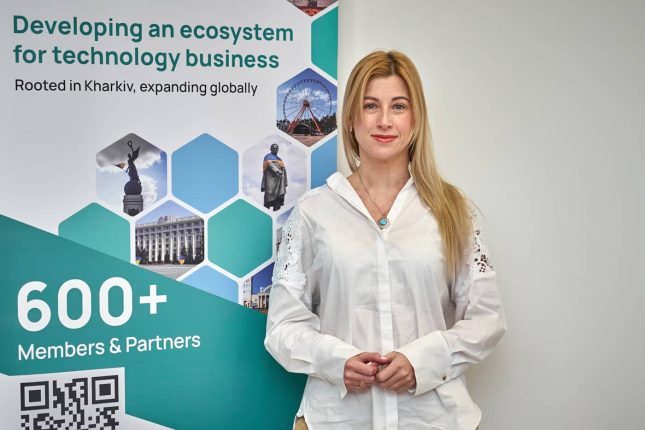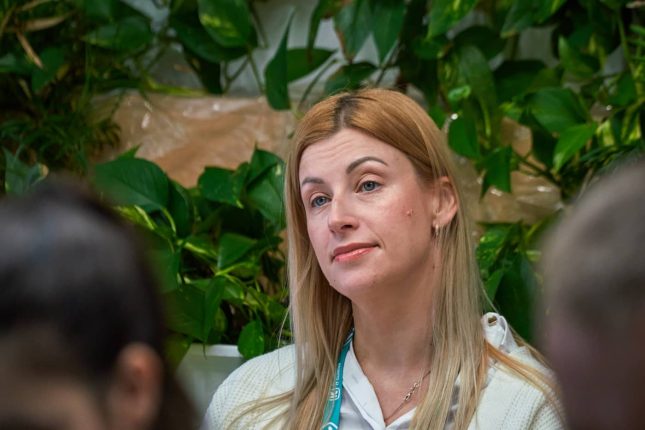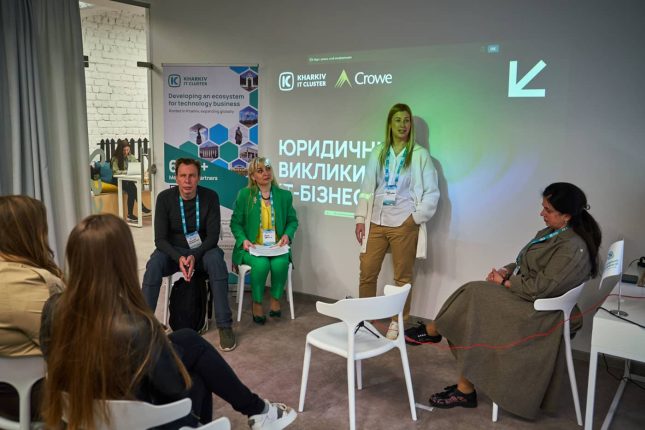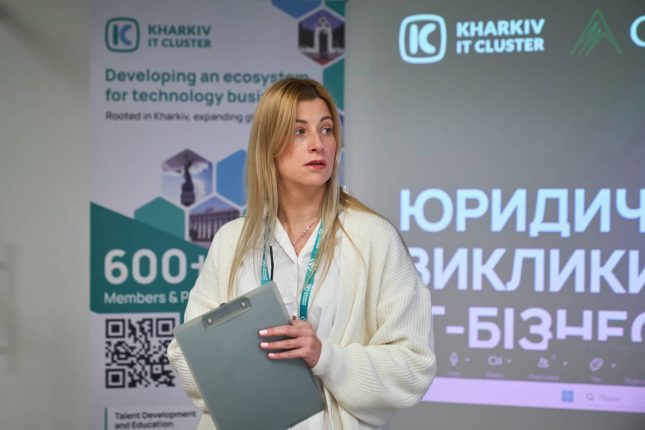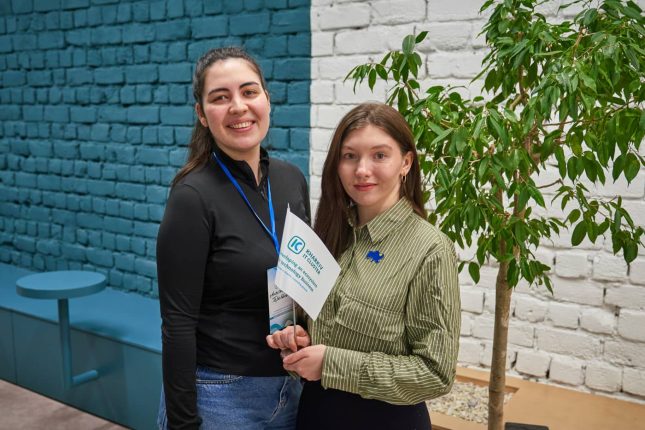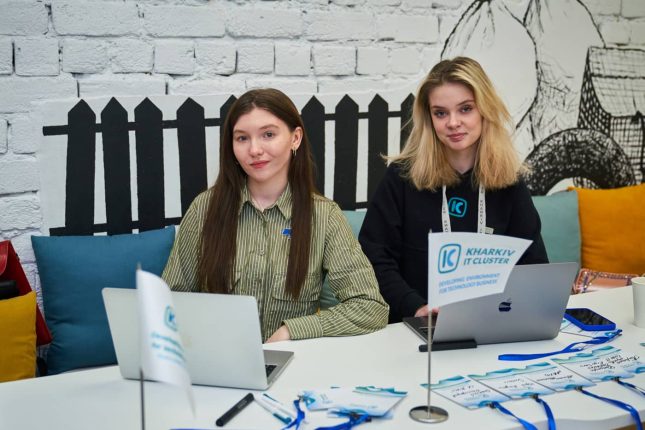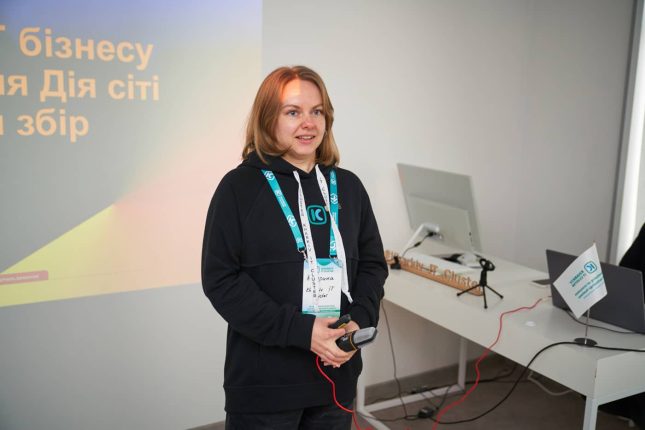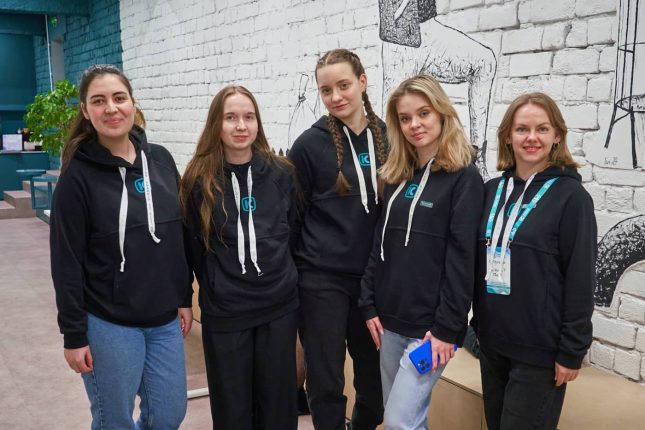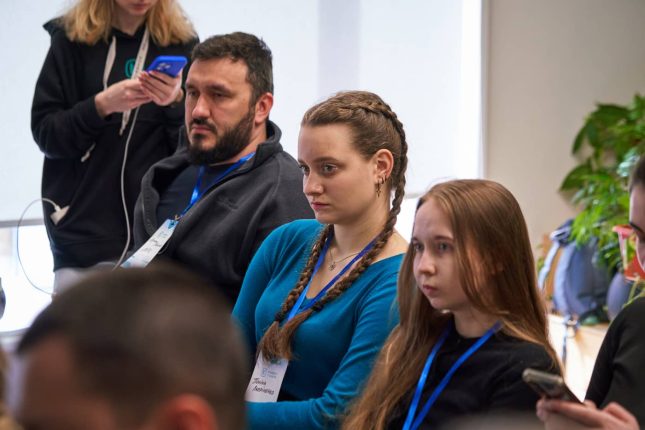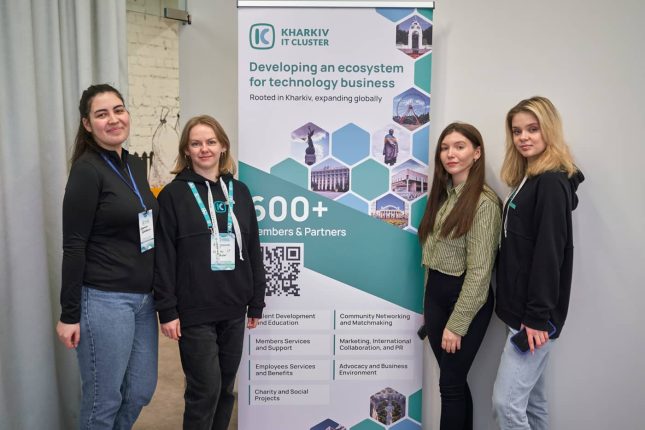
Frontline digitalisation: Kharkiv IT Cluster collaborations
13/05/2025
The Kharkiv IT Cluster in Ukraine is actively working to attract funding and partnerships and to strengthen the ecosystem that supports technology businesses, even in times of crisis. In 2024, this community of leading Ukrainian IT companies, educational institutions and government stakeholders was a winner of European cluster benchmarking, receiving the prestigious European Cluster Excellence Initiative (ECEI) Bronze Label, with EU4Digital Facility support. As Olha Shapoval, Executive Director of Kharkiv IT Cluster explained in an interview with Ukrainian media site Channel 24, international support and effective interaction with government institutions are key factors in the development of Kharkiv IT Cluster and Ukraine’s IT sector.
“We are sincerely grateful to international donors (USAID, GIZ, UNDP, the European Commission and others) for the trust that allows us to scale initiatives and achieve tangible results for the development of technology businesses in Ukraine. It is important to remember that these funds are contributions from taxpayers of other countries, so we feel a special responsibility for the transparency and efficiency of their use,” – says Olha Shapoval.
Challenges and state cooperation
How has your cluster resolved any difficulties you faced in relation to donor issues and grants? Is there cooperation with the state in this regard?
“From the beginning, the Kharkiv IT Cluster did not build its projects exclusively on grant funds, as membership and partnership contributions have always been a reliable foundation for the launch and implementation of many educational and business initiatives. This balance gives us the necessary flexibility in decision-making and sustainability in any conditions. However, grant programmes are often accompanied by lengthy approval procedures, while some local foundations have excessively short deadlines for the preparation and implementation of projects. We managed to overcome these challenges by creating an office responsible for projects and grants, and by establishing transparent management. This helped to consolidate our reputation as a reliable partner and contributed to the development of the entire IT ecosystem.
“We do not receive direct funds from the state budget, but we do actively involve the Ministry of Digital Affairs, the Ministry of Education and Science, the Ministry of Veterans Affairs, the Ministry of Defence, the Ministry of Economy, and local authorities as stakeholders and experts in our initiatives. Such cooperation helps develop a favourable environment for IT businesses, improve educational programmes, and support veterans and regions most affected by the war. This proves once again that even without budget funding, the state can be a reliable partner in strategic areas.”
What main challenges and obstacles does your cluster currently face in terms of grants? What are the positive achievements?
“The main challenge when working with European programmes is the long approval cycle — up to a year from the announcement of the competition to the start — while in international foundations’ local offices, the deadlines for submitting and implementing projects can be too short — from several months to a year. This requires us to have clear planning, effective project management and the ability to adapt quickly.
“However, it was grant funds, combined with membership fees and the expertise within Kharkiv IT Cluster, that made it possible to:
- scale the educational direction: over 10 years of work, more than 40 educational initiatives have been implemented, and the network of partnerships covers 213 educational institutions;
- support businesses in crisis conditions: the IT Cluster in the Cloud project (USAID) helped 300+ IT companies retain teams and maintain export activities during the war;
- expand international cooperation: thanks to the status of the Enterprise Europe Network contact point, the Ukraine-Ready4EU service, as well as the coordination of the European ITBridge project, cluster participants can benefit from new sales markets, investments and partners around the world;
- facilitate the attraction of funds from the European Commission: solid experience in grant management and a good reputation increase the chances of successful participation in European competitions with a large budget.
“Such achievements demonstrate that we are not just attracting additional resources, but also guaranteeing a long-term effect: developing the IT sector, supporting innovation in small and medium-sized businesses, and contributing to solving socially important tasks.”
Interaction with participants
How does your cluster help its participants, in what areas and what kinds of specialists do they need?
“The Kharkiv IT Cluster develops a holistic ecosystem where companies gain access to diverse services and projects that help them grow and expand their activities. The main areas of activity include:
- development of business and export potential: participation in the Enterprise Europe Network, Ukraine-Ready4EU, ITBridge programmes and cooperation with European IT clusters (for example, Transilvania IT Cluster, Digital Cluster of Catalonia) open the way to new sales markets and partnerships;
- education and talent training: thanks to a developed network of educational partnerships, including 213 educational partners, we improve the quality of educational programmes, provide companies with direct access to universities, actively attract talent to the IT industry, and systematically improve the quality of technological education;
- legal support and advocacy: we advise on all issues of doing IT business in Ukraine and abroad, tax issues, bookings, business trips, and we also interact with government authorities, in cooperation with other associations and clusters, to improve business conditions;
- networking and professional clubs: 11 internal professional clubs of Kharkiv IT Cluster allow specialists to share experiences, discuss common challenges, and generate new ideas;
- social initiatives: the IT4Life charitable foundation provides transparent mechanisms for assisting veterans, internally displaced persons, and the reconstruction of affected regions.
“Recently, there has been a growing need for hardware specialists: specialists in sensor fusion, autonomous systems, UAVs (unmanned aerial vehicles), and robotics. Engineers who can combine machine learning, real-time data processing and mathematical modelling are in demand. That is why we are developing new educational programmes and engaging companies in joint activities to create a sufficient talent pool.”
Is your cluster’s need for digital tools met and is there access to the necessary tools, such as paid versions of AI, software? Are there programmes that your cluster participates in to cover funding or gain access to tools?
“We appreciate partners who already provide us with discounted or free solutions (e.g., from Canva, Noty.Ai, Zoom), but there are still areas where specialised software or paid artificial intelligence platforms are lacking. In the context of the full-scale war in Ukraine, the state budget cannot cover these costs, so we are constantly looking for alternatives within the framework of grants and initiatives like Eastern Ukraine EDIH to expand access to more sophisticated digital solutions.
“Thus, we help participants remain competitive in the global market, and we show donors that their support is used to strengthen the entire IT ecosystem and form sustainable digitalisation mechanisms that are beneficial to both business and society.”
What are the results of EU4Digital support?
The EU4Digital report on Innovation Clusters in the Eastern partner countries maps EaP clusters and provides analysis and recommendations for support: has this and other EU4Digital support been relevant and useful for your cluster?вання сталих механізмів цифровізації, які корисні і для бізнесу, і для суспільства.
“The EU4Digital report recommends effective approaches to cluster development and interaction with government institutions, which has proven particularly valuable for our work. Thanks to this report, we took into account:
- best European practices that suggest how to strengthen the competitiveness of the Kharkiv IT Cluster and its participants;
- performance measurement tools that help us better understand our impact and plan strategy for the future;
- the importance of government dialogue, as established relations with authorities can accelerate decision-making and attract additional resources, as soon as financial opportunities arise.
“By using these recommendations, we are expanding our network of international partnerships, making our initiatives more transparent and effective, and, as a result, strengthening the trust of international donors, community participants and society.
“Using best European practices and performance assessment tools helped our cluster strengthen its position, increase competitiveness, and establish relations with the state. Cooperation with the state, although without direct funding, plays a key role in creating a favourable environment for the development of IT business and education.”
The Kharkiv IT Cluster and other clusters selected to receive EU4Digital support in the European Cluster Management Excellence benchmarking and quality labelling process were announced during the EU4Digital ICT Innovation Forum on 9 October 2024, in Moldova.
Author: Lev Shevchenko
Stories
-
Katarina Mathernova: If Ukraine had a human face and a human spirit, it would be 10-year-old Roman Oleksiv
-
A regional mission to drive social entrepreneurship: the story of Ksenia Kosukha
-
EU restores safe water supply for 100,000 Ukrainians affected by war
-
Promoting IT during the war: Lviv IT cluster and how EU4Digital helps
-
How EU4Youth is driving opportunity and success among young Ukrainians
-
“When we go to class, it’s a holiday for us”
